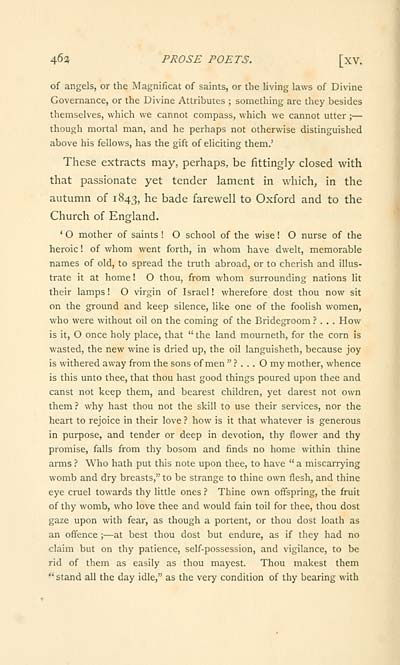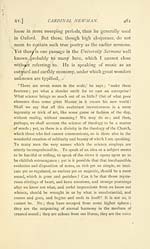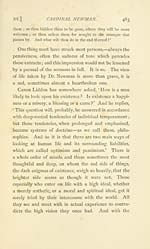Ossian Collection > Aspects of poetry
(478)
Download files
Complete book:
Individual page:
Thumbnail gallery: Grid view | List view

46il PROSE POETS. [xv.
of angels, or the Magnificat of saints, or the living laws of Divine
Governance, or the Divine Attributes ; something are they besides
themselves, which we cannot compass, which we cannot utter ; —
though mortal man, and he perhaps not otherwise distinguished
above his fellows, has the gift of eliciting them.'
These extracts may, perhaps, be fittingly closed with
that passionate yet tender lament in which, in the
autumn of 1843, he bade farewell to Oxford and to the
Church of England.
' O mother of saints ! O school of the wise ! O nurse of the
heroic ! of whom went forth, in whom have dwelt, memorable
names of old, to spread the truth abroad, or to cherish and illus-
trate it at home! O thou, from whom surrounding nations lit
their lamps ! O virgin of Israel ! wherefore dost thou now sit
on the ground and keep silence, like one of the foolish women,
who were without oil on the coming of the Bridegroom ? . . . How
is it, O once holy place, that " the land mourneth, for the corn is
wasted, the new wine is dried up, the oil languisheth, because joy
is withered away from the sons of men " ? . . . O my mother, whence
is this unto thee, that thou hast good things poured upon thee and
canst not keep them, and bearest children, yet darest not own
them? why hast thou not the skill to use their services, nor the
heart to rejoice in their love ? how is it that whatever is generous
in purpose, and tender or deep in devotion, thy flower and thy
promise, falls from thy bosom and finds no home within thine
arms ? Who hath put this note upon thee, to have " a miscarrying
womb and dry breasts," to be strange to thine own flesh, and thine
eye cruel towards thy little ones ? Thine own offspring, the fruit
of thy womb, who love thee and would fain toil for thee, thou dost
gaze upon with fear, as though a portent, or thou dost loath as
an offence ; — at best thou dost but endure, as if they had no
claim but on thy patience, self-possession, and vigilance, to be
rid of them as easily as thou mayest. Thou makest them
" stand all the day idle," as the very condition of thy bearing with
of angels, or the Magnificat of saints, or the living laws of Divine
Governance, or the Divine Attributes ; something are they besides
themselves, which we cannot compass, which we cannot utter ; —
though mortal man, and he perhaps not otherwise distinguished
above his fellows, has the gift of eliciting them.'
These extracts may, perhaps, be fittingly closed with
that passionate yet tender lament in which, in the
autumn of 1843, he bade farewell to Oxford and to the
Church of England.
' O mother of saints ! O school of the wise ! O nurse of the
heroic ! of whom went forth, in whom have dwelt, memorable
names of old, to spread the truth abroad, or to cherish and illus-
trate it at home! O thou, from whom surrounding nations lit
their lamps ! O virgin of Israel ! wherefore dost thou now sit
on the ground and keep silence, like one of the foolish women,
who were without oil on the coming of the Bridegroom ? . . . How
is it, O once holy place, that " the land mourneth, for the corn is
wasted, the new wine is dried up, the oil languisheth, because joy
is withered away from the sons of men " ? . . . O my mother, whence
is this unto thee, that thou hast good things poured upon thee and
canst not keep them, and bearest children, yet darest not own
them? why hast thou not the skill to use their services, nor the
heart to rejoice in their love ? how is it that whatever is generous
in purpose, and tender or deep in devotion, thy flower and thy
promise, falls from thy bosom and finds no home within thine
arms ? Who hath put this note upon thee, to have " a miscarrying
womb and dry breasts," to be strange to thine own flesh, and thine
eye cruel towards thy little ones ? Thine own offspring, the fruit
of thy womb, who love thee and would fain toil for thee, thou dost
gaze upon with fear, as though a portent, or thou dost loath as
an offence ; — at best thou dost but endure, as if they had no
claim but on thy patience, self-possession, and vigilance, to be
rid of them as easily as thou mayest. Thou makest them
" stand all the day idle," as the very condition of thy bearing with
Set display mode to: Large image | Transcription
Images and transcriptions on this page, including medium image downloads, may be used under the Creative Commons Attribution 4.0 International Licence unless otherwise stated. ![]()
| Early Gaelic Book Collections > Ossian Collection > Aspects of poetry > (478) |
|---|
| Permanent URL | https://digital.nls.uk/78391008 |
|---|
| Description | Selected books from the Ossian Collection of 327 volumes, originally assembled by J. Norman Methven of Perth. Different editions and translations of James MacPherson's epic poem 'Ossian', some with a map of the 'Kingdom of Connor'. Also secondary material relating to Ossianic poetry and the Ossian controversy. |
|---|
| Description | Selected items from five 'Special and Named Printed Collections'. Includes books in Gaelic and other Celtic languages, works about the Gaels, their languages, literature, culture and history. |
|---|

